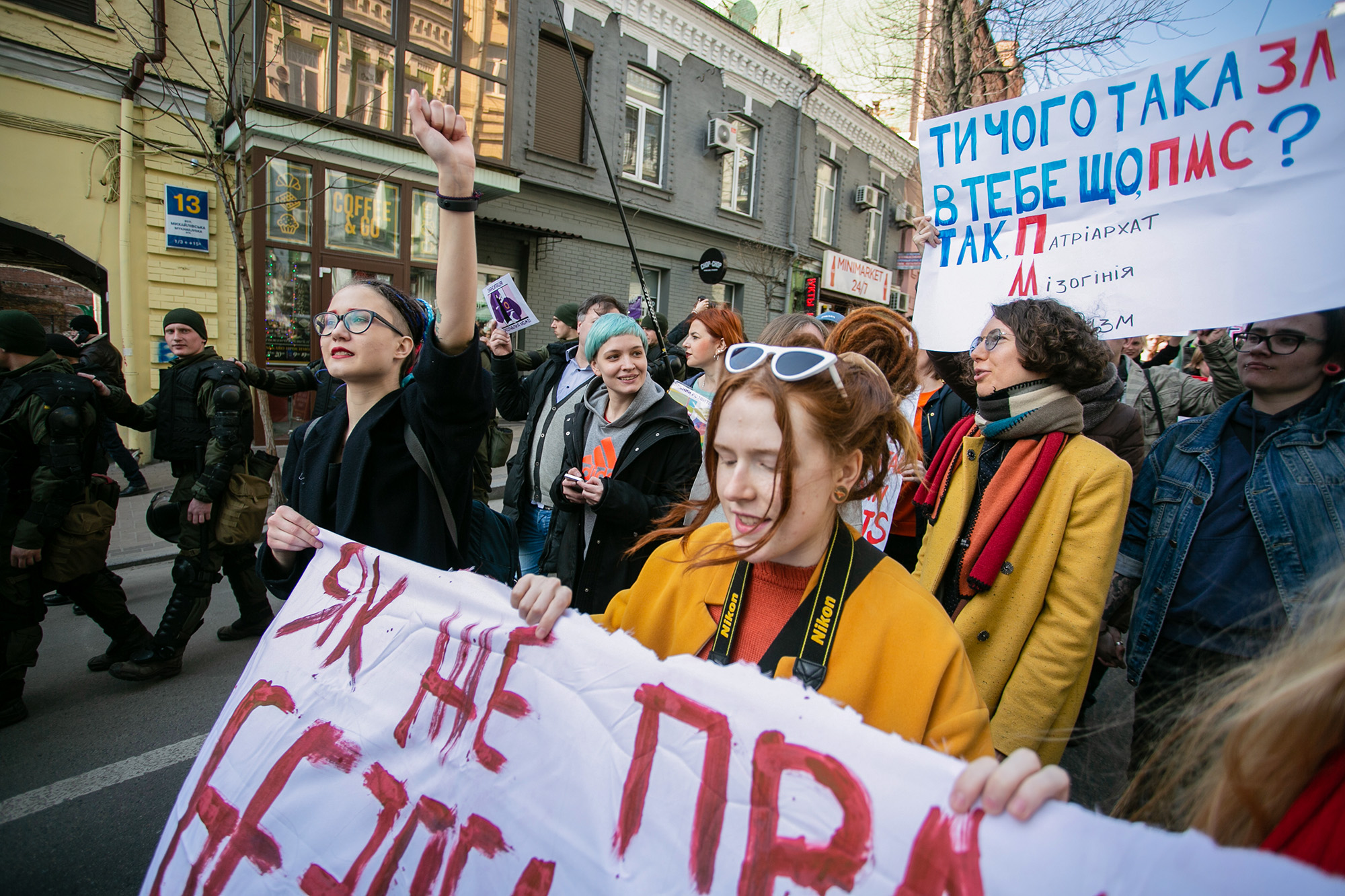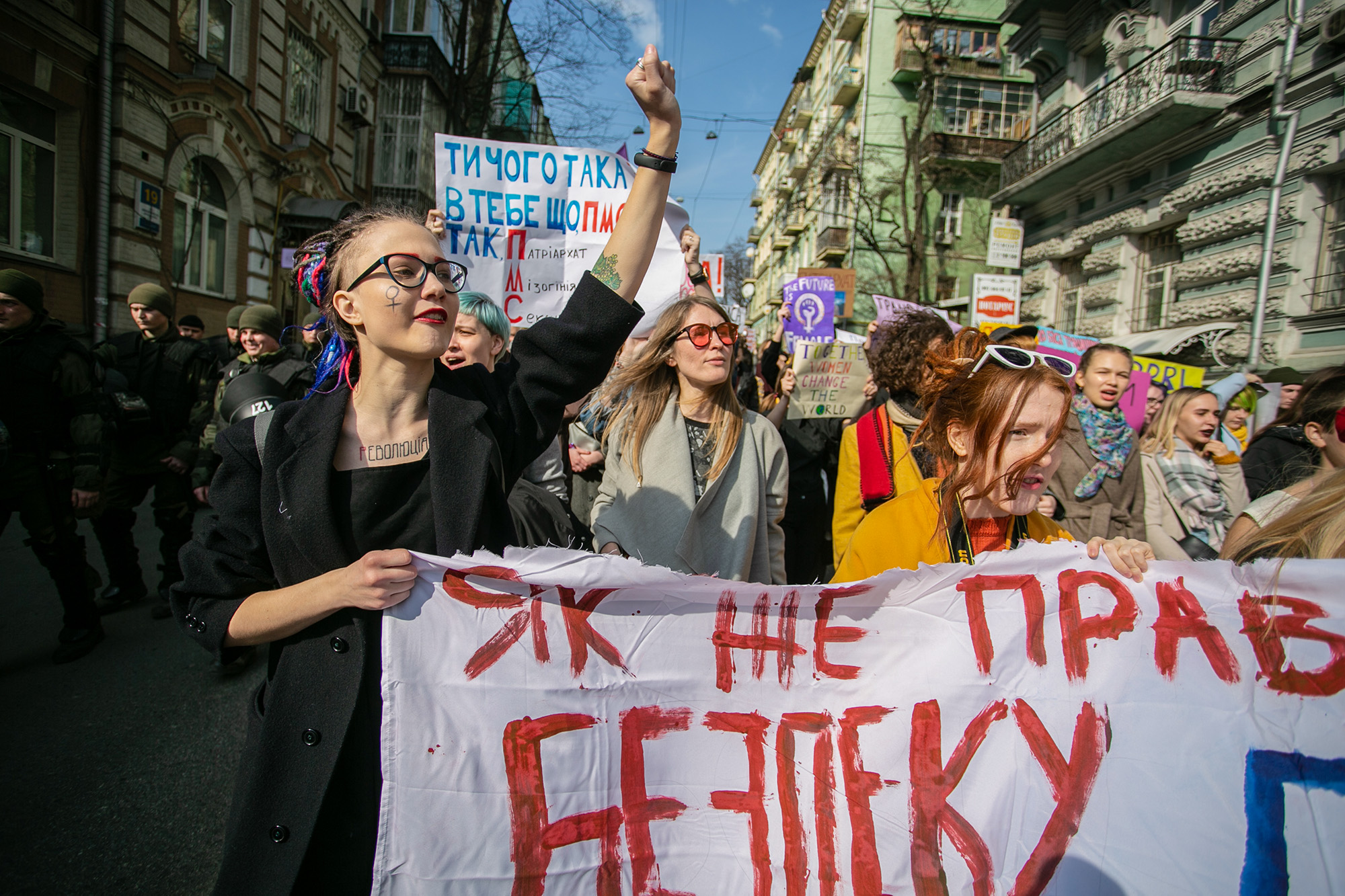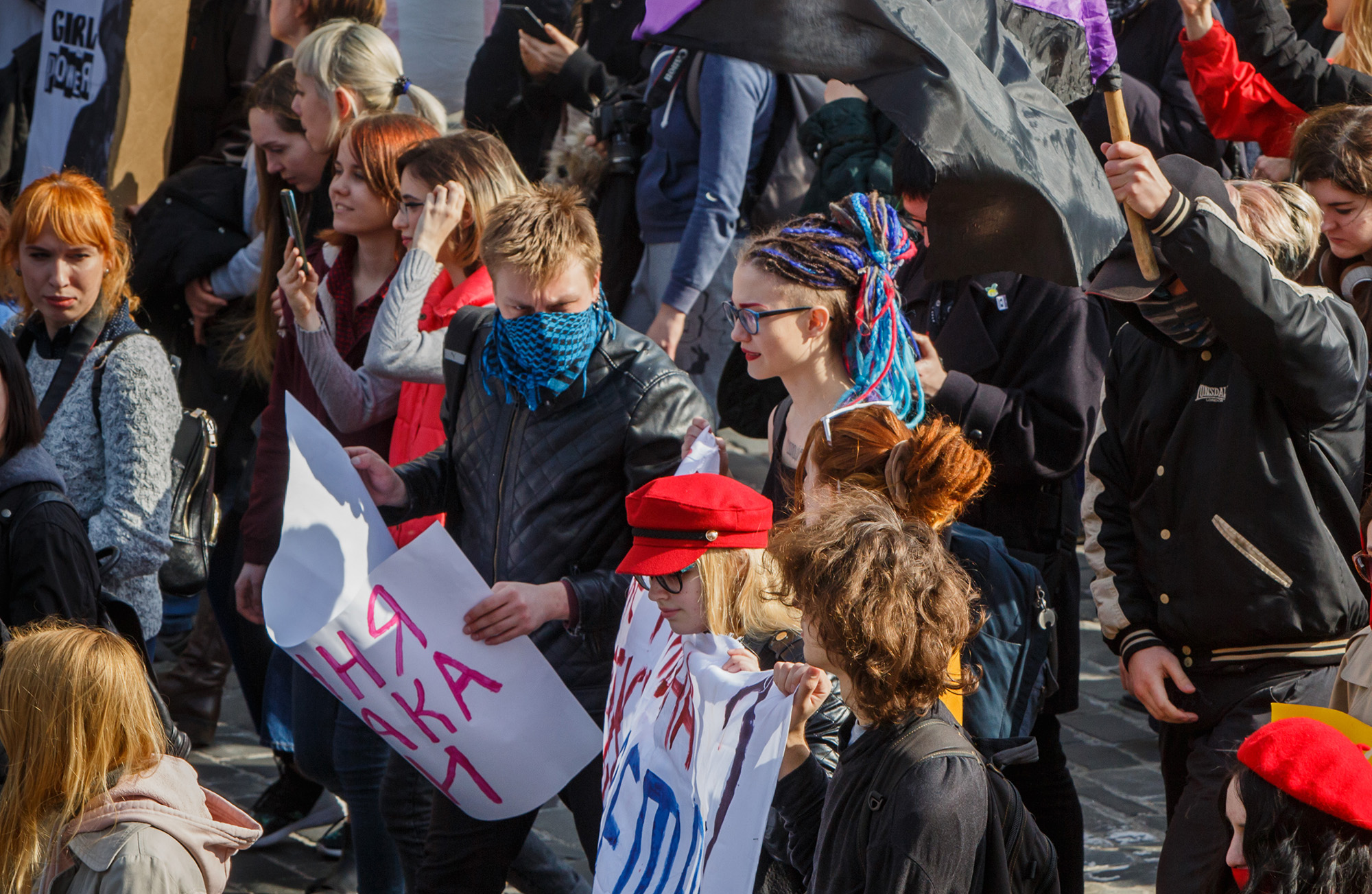
Girl, Why Are You So Sad?
Clementine Kvindt is a second-year student at the Institute of Biology and Medicine at the Taras Shevchenko Kyiv National University, one of the best-known and most reputable colleges in Ukraine. Recently, the IDP from Crimea and future zoologist became the face of the protest against harassment and violence in institutes of higher education.
Petro Romanenko is a 47-year-old lecturer, PhD in biology, and lecturer at the Institute of Biology and Medicine at the Taras Shevchenko Kyiv National University. He taught a summer course at the Kaniv Nature Preserve. It is he whom Clementine Kvindt and other students have accused of sexual harassment.
A girl in a long coat and glasses strides confidently toward me. She shakes my hand. Her multicolored dreads are gathered in a thick bun on the top of her head. She’s wearing bright lipstick. This is not her first interview in the last few days. Finding herself in a complicated situation she decided not to keep quiet and to fight for herself and her friends—she spoke openly about the teacher’s harassment in an article on the Nihilist portal.
“He’s a local legend,” Clementine says about Petro Romanenko when we meet at the Dovzhenko Center.
The events that Romanenko figures into took place during a summer internshipfor first-year students at the Kaniv Nature Preserve. For many students, including some minors, this is their first extended trip without their parents. The closest city is half an hour away by bus. It is almost completely cut off. For four weeks, the students study biodiversity in these nearly isolated conditions: they take long walks in the forest and swamps, row boats out to islands, do lab work on insects and plants.
One day after an excursion, Romanenko allegedly offered to drive Clementine and a few other students to an ATB convenience store in the city of Kaniv. They agreed, but when one of Clementine’s classmates sat in the front seat, Romanenko stopped him: “Let a girl sit there and be the stewardess. Preferably the prettiest.” No one paid particular attention to this except for Clementine—she was the one who had to sit next to him.
She talks about another episode. It was ten o’clock at night on a Friday, the evening before exam day. Romanenko burst into the girls’ room in the dormitory. They were in their nightgowns. The drunk teacher told Clementine that she would certainly pass her exams since she was so pretty. And then he suddenly made the gesture for cunnilingus.

There were other girls in the room. Linda Zorkot, a second-year student at the Institute of Biology, was among them.
“He could barely stand up. He was talking to us and touching things, and before he left he wished us erotic dreams. Another teacher led him out of the room. Without a fight, calmly. But the general picture was disgusting,” she recalls six months after the incident.
We’re talking in a café near Shevchenko’s University’s red campus. Linda, a slight girl with long hair, has agreed to talk about Romanenko’s harassment, but she makes practically no public appearances and does not comment on the situation in social media. She says that in January when Clementine decided to write about the teacher in the article, she had neither the strength nor the faith that something could be done.
Before her trip to Kaniv, just like Clementine, she had heard about Romanenko’s harassment and tried in every way to avoid him.
“When I saw him, I would step to the side so, God forbid, I didn’t run into him,” Linda says.
She thought it was fortunate that she didn’t end up in the group taught by Romanenko. But he still accosted her during the student dance party in Kaniv.
He could barely stand up. He was talking to us and touching things, and before he left he wished us erotic dreams. Another teacher led him out of the room
“My girlfriend was right beside me at the party but then she left,” Linda recalls that evening. “I was about to go back to our room, but Romanenko came up to me, grabbed me by the waist and the hand, and started dancing and pressing up against me. I could feel that he had an erection. Shocked, I got away from him. I heard him call after me, ‘Why are you so sad! Be simpler.’ I silently returned to the room.”
The students told the administration about the incident almost immediately. But it took six months for the college to recognize the problem. It took the students’ publicly talking about the harassment and withstanding harsh criticism from other students and teachers for this to happen.
Everyone Knows About It
Harassment in the college is no news. Students from upper classes warn the first-years about Romanenko, but they don’t see a big problem in this.
“He accosts girls and lets his hands wander, but he’s a good lecturer—he gives out grades. He’s fine,” Clementine was told at a meeting with the student coordinator when she started her first year at the institute.
They also knew in Kaniv. Linda found out about it from the nurse who was working there during the summer internship.
“She said he behaved that way during every internship. Everyone knew about it. The nurse sighed heavily,” Linda recalls. She went to her for help right after the incident at the dance when Romanenko touched her.
“At first I didn’t say anything at all, nothing. I was sitting and thinking: Do I tell anyone about this? It happened almost voluntarily. I didn’t shove him off, didn’t say anything to him. Why not?” Linda keeps asking herself.
After a few days the students went to their internship director Vladlen Trokhymets to tell him about Romanenko’s harassment.
“This was probably not the first ‘showdown.’ I think he even said that there had been incidents and that he had already talked to the teacher,” Linda recalls Trokhymets’s words. He offered to talk to Romanenko again. The students also filed a grievance in case the conversation didn’t work.

When Clementine’s article on harassment was published, students from other classes started telling their own unpleasant stories with Romanenko, too.
“In 2012 Romanenko entered our room after lights out—obviously drunk—and proposed going with him to the sauna on the banks of the Dnipro. He tried kissing my classmate,” Kateryna Antonovych wrote on Facebook. I regret that I simply “froze up and went to tell my girlfriends, but did not file a grievance against this lecturer.”
“In 2010, Romanenko was in charge of our Kaniv internship. He lived on our floor, next door to us,” Marko Mykytenko wrote on social media. “When I was on duty in the cafeteria, I realized there were not enough portions for all the students’ and I went to Romanenko about this. After solving the problem, he suggested I visit his room in the evening because I had pretty earrings and he knew what I might like. I mostly managed to ignore him. Moreover, Romanenko twice told me he would visit my room after lights out . . . He winked and said I could use the refrigerator on special deals. All these incidents were accompanied by attempts at physical contact—hugs or touches. When other students broke our key when trying to get into our room, they offered us an empty room to sleep in. Romanenko suggested I sleep in his.”
The student adds that other girls shared similar stories. “Unfortunately, I didn’t realize back then how unacceptable this was, so I just avoided contact,” she wrote.
A Girl That Fights Back
“Men like this think they can do whatever they want. But sooner or later they come across brave girls who bite back,” Clementine says. “I want him to answer for his behavior. The law is the same for everyone. If someone violates it then he must pay as is outlined in the law.”
After another student’s complaints, Romanenko was quietly removed from the internship, but he kept teaching and complained to other students about the girls who committed “slander” against him.
“It finally hit us. We realized that he had really gone too far and believed he was right. Like he can get drunk and grope girls at the student dances, go to their rooms to tell them how awesome he is at cunnilingus. And later say that we dumb aggressive feminists were suppressing him,” Clementine is angry.
At first she and two other students decided to meet with Romanenko and suggested he apologize and go without a lot of fuss. The apology was supposed to be recorded on video. The teacher initially agreed, but later lost his nerve and fainted. After this meeting, he went on sick leave.
He later commented on the accusations of harassment by telephone to Hromadske: “There was nothing that crossed any lines,” Romanenko says. “I just met with a student. This is the fourth slander against the director and other teachers. This is a form of self-expression. There are a lot of lies, especially on the internet. But that would take forever to talk about. It was an internship like any other. There was nothing on my part to now be tarnishing my name so.”
Clementine got 40 signatures from other students, both female and male, demanding Romanenko be fired and took the petition to the administration of the institute. She encountered resistance there too.
“Clementine, why are you lying?” she recalls what the director of the Institute Liudmyla Ostapchenko said to her. Clementine had gone to her with the complaint and the demand for Romanenko’s dismissal. “This isn’t just about the Institute; this is about everyone. You’re doing everyone wrong. Why are you causing a scandal?”
Yet they decided to investigate the incident.
The students who decided to speak up about the lecturer’s harassment have become the objects of persecution in chat rooms and on social media. These waves of hatred are usually being raised by other students, teachers, and scientists

Clementine officially told the rector, the Ministry of Education and Science, and the office of the Commissioner for Human Rights about the situation with the harassment. She also went to the police to file a sexual harassment complaint.
“Everything that I’m talking about I wrote in my police report. I know that false testimony is a criminal offense so I am responsible for every word that I wrote in Nihilist and say to journalists,” she says.
She learned to stand up for herself after she had to leave her home, Crimea, at age 14 when it was annexed by Russia. She moved to Kyiv, enrolled in college and now lives here alone.
“After your home is taken away, you can do anything, simply anything. We women have to stand up for each other,” Clementine says.
Waves of Hatred
Since summer, the students who decided to speak up about the lecturer’s harassment have become the objects of persecution in chat rooms and on social media. These waves of hatred are usually being raised by other students, teachers, and scientists.
“Be honest, are you working for the Russian FSB?” one of the messages in Clementine’s Facebook Messenger starts out. It was written by an employee at the National Academy of Science of Ukraine.
“I would be interested in meeting with Clementine Kvindt in hell, where she’s definitely going (just like me) and gloat a little there. This lynching she’s carrying out today, having assumed the right to judge others and bring justice on earth upon others’ corpses—is an order of magnitude worse than harassment. Such things cannot be written off as youth. I never stab anyone in the back; I always give a warning. Baseness, guile, aggression, and libel going unpunished—this is the norm of behavior for higher primates. Welcome to the club of apes,” professor and chair of the Institute of Zoology at the National Academy of Sciences of Ukraine, Valerii Kornieiev, commented on Clementine’s Facebook post.
“I only stab in the back thoses who grab students’ breasts,” Clementine joked back.
On Facebook she’s being told that she’s ruining someone’s life, that she is emotionally unbalanced, manipulative and incapable of independently solving her own problems. They teach her how she should have behaved. Clementine is also reproached for deciding to “hype” it up after changes to criminal legislation regarding mandatory consent for sexual relations came into force.
“There’s an entire thread of 600 messages on Dva.ch [a Russian-language imageboard website similar to 4chan — R.] where I’m being called a common whore,” Clementine says. “They’ll later delete this thread, but I remember the words that I should be tracked down, given to the Rights, murdered, and have my face bashed in.”
According to Clementine, the thread was started by one of the members of the student parliament.
The organ of student self-government also decided not to “take the trash out.” Many of its members openly stand on the side of Romanenko. The students are gathering signatures in his defense. The session of student parliament that was supposed to look into the matter of harassment was suddenly switched from a public to a closed one.
At first those who came to support Clementine—the mass media and observers whom the girl had invited the day before—were prevented from entering the building of the institute. When the people were eventually admitted and the meeting started, Taras Voitsitsky changed the agenda and avoided the burning topic. Despite this, Clementine was able to briefly gain the floor and make a statement. Yet the head of the student council tried to push her away from the microphone. After this he announced the session closed. Almost all the students obediently left the room.
“I’m talking about violence that happened in front of my eyes, saying that I can confirm this in court. I’m saying this in an auditorium of three hundred people and half of them—all the members of the student parliament—are laughing at me,” Clementine is indignant.

By Default
“Where is the line: what’s a compliment and what’s not?” Romanenko’s colleagues ask. Job descriptions feature no clear instructions for what to do in the case of harassment or sexism. Lecturers say that they’ve always been guided by intuition and life experience.
“I suppose that he was making some questionable jokes. I myself have sometimes done this,” admits Anatolii Podobailo who has taught with Romanenko for many years. “Because you have three classes in a row and you’re spending six hours with students. If you show them a mushroom that looks like a male sexual organ and make a joke about it, they remember the information better. Things that we forty-year-olds take as the norm, the girls could have taken as something indecent. I didn’t know the word ‘harassment’ itself until I read it in some report,” Anatolii says.
He gives the girls credit for raising this matter, but he does not recognize their methods, which he calls “all that hype.”
“It’s not great that they framed their teacher up to address this issue. This is my standpoint,” Podobailo says. And he assures that he has never seen Romanenko anything less than sober at classes or pestering girls or entering their rooms late at night.
“Where is the line: what’s a compliment and what’s not?” Romanenko’s colleagues ask. Job descriptions feature no clear instructions for what to do in the case of harassment or sexism
Another lecturer who has asked to remain anonymous gives a murky answer to the question of why he didn’t speak about this problem earlier.
“I don’t know. For some reason our generation does not use seatbelts in cars and we smoke at bus stops. That’s what we’re used to. But generations change and they have new ideas and views on the world,” the lecturer says.
In conversation, he also confirmed: there have been other instructors who have pestered female students. But he added that while everyone talks about it, he hadn’t ever directly witnessed it.
“I can tell you for sure that there were no such complaints,” says Dr. Volodymyr Buhrov, prorector for scientific and pedagogical work and professor at Shevchenko University. “This is the first time in my tenure. I don’t deny that this could have happened earlier, too, but no one was talking about it.”
Buhrov headed the university committee that investigated the incident, which examined statements by victims, witnesses, and Romanenko’s testimony, as well as hearing out those who vow that there was no harassment. He says that in his view, the situation is too “overgrown with myths.”
“When we got the written testimonies, we read them carefully and realized that ultimately there were only two acts in which people were speaking about themselves, and four utterances that people had heard directly,” Buhrov explains. For example, Clementine writes in her statement that in 2013 Romanenko did x. But in 2013, Clemetine wasn’t here. And [we’re not going to — R.] take into consideration what’s written on Facebook,” he adds.
Buhrov agrees that the institute did not react in a timely fashion so the situation got out of control. However, Buhrov still has no questions for Trokhymets, the internship director in Kaniv who decided to limit himself to a conversation with Romanenko and not let the students’ grievance go anywhere.
“Here the situation is that the students themselves did not sign this appeal. And when the internship director asked them if they had any complaints, they said ‘no.’ Formally, their signatures would be required to move further,” the prorector is referring to bureaucratic procedures.
On February 22, Petro Romanenko was dismissed from his position—the decision was published on the university’s site
The committee that spent a few weeks investigating the harassment case came to its own conclusions. It identified that “some of Romanenko’s deeds and utterances do not meet the ethical standards of academic and pedagogical workers.”
On February 22, Petro Romanenko was dismissed from his position—the decision was published on the university’s site.
The information that the committee gathered was also passed along to the police per request. In addition to this, the college promises to introduce a policy for preventing unethical behavior. The rector’s office says that there will be a lecture or a practical lesson for first-years in all departments.
Not Just a Matter of Ethics
“There’s no communication culture in our educational institutions. In the professional environment there have to be certain rules and mutual respect, with no bullying or ambiguous remarks. Harassment can also occur on a horizontal plane between colleagues,” Dr. Tamara Martseniuk, sociologist, expert on gender studies, and professor of social science and social technologies at Kyiv-Mohyla Academy says.
This concerns not only educational institutions, but also the entire Ukrainian labor market.
“This is because the subject of sexual violence is taboo in Ukraine, just like violence in general. We have a high level of tolerance for various forms of violence: psychological, physical, and bullying,” says Martseniuk.
In her opinion, the situation is slowly changing. She believes that the online campaign started by Anastasia Melnychenko in 2016 #янебоюсьсказати, or “I’m not afraid to say,” played a big part in this. Melnychenko called on female Ukrainian Facebook users not to keep quiet about the violence they had experienced.
In 2017, female students at Kyiv-Mohyla Academy organized a student protest against sexism and harassment in colleges. They filed a complaint against a certain professor for his sexist remarks. The campaign took on greater resonance when a few dozen radicals attempted to interfere with the protest and support the accused lecturer.
After this campaign, the Kyiv-Mohyla administration decided to develop a policy of preventing and fighting sexual harassment.
“We are only beginning the process of introducing it,” says Martseniuk, who took part in developing the policy over a year and will continue to deploy it. Experts will work with three target groups: students, the teaching staff, and the administration. “Some people are skeptical of this. The key question is: ‘Is this really happening at the university?’ Far from everyone is capable of seeing the problem with instructors uttering sexual stereotypes during classes. For example, that a woman’s calling is to successfully get married.”
The expert in gender studies also speaks about how harassment often coincides with corruption:
“Non-transparent procedures, unclear evaluation criteria, and the opportunity to abuse power—if colleges aren’t doing anything to combat corruption, then there is every chance that they’re not working to stop sexual harassment either,” says Martseniuk.
There Must Be Punishment
Among supporters of the students at Shevchenko University is the student group FemSolution from Kyiv-Mohyla.
“We’d like to express our support and solidarity with everyone who’s participating in the protest. As well as with those who have encountered violence in academic space. Many of us know from personal experience how the university administration can apply its own resources and put pressure on female students, using threats and scare tactics. How the administration uses the strategies of devaluing and blaming the victim with the goal of justifying the perpetrators of violence,” the organization stated.

Also on the side of the students from Shevchenko University—their parents.
“My dad recently said that I’m the bravest woman he knows. And my mom told me that she had been harassed by a 70-year-old teacher. That was 30 years ago and she hadn’t told anyone about it. She had kept quiet all this time because she thought that such things couldn’t be talked about. I am the first person she’s told,” Clementine says. She recently got a tatoo on her chest, right beneath her clavicle: the word “REVOLUTION” with a red “R.”
After thinking about it, she decided to quit the institute. On her 18th birthday, she took a photo in front of the university’s red campus. She posted it on Facebook with the caption, “I’m giving myself the best present—I’m quitting this trash hole.”
“If we continue to have student parliaments like the KNU Institute of Biology has, then we will all continue to live under Soviet-style repressions,” she added, tagging the student self-governance organization, and wishing everyone “happiness without repressions and violence.” She’s planning on going to Germany to study, but she’s not leaving the situation with the lecturer; she’s hoping for justice in court.
Linda remains at the institute. For her, the battle means a lot:
“I’ve invested too much energy and emotions to leave this all now. It is important that girls know we need to talk about this and then such actions will be punished.”
Since January of this year, sexual violence in the Ukrainian criminal and criminal-procedural codices is being treated in a new way. Whereas earlier it was only considered a crime in the case of physical assault, it now includes “any violent act of a sexual nature, unrelated to the penetration of another person’s body without their voluntary consent.”
As Mykola Khavroniuk, lawyer and professor in the department of criminal and criminal-procedural law at Kyiv-Mohyla Academy, explains, this is about cases when someone, for example, gropes another person’s buttocks, presses up against her body, even if dressed, embraces or touches her in attempt to be sexually close. Responsibility for such crimes committed while working in an “official, professional, or public capacity” could mean three to seven years in prison. If minors are involved, the term is from five to seven years.
The fact that the students started making public announcements about harassment is enormous progress toward changing the narrative that will take place over the next few years.
“Because my generation,” explains Oksana Pokalchuk, director of Amnesty International Ukraine, “still abides by the notion that if something happens, at most I’ll tell my girlfriend about it. But the new generation is learning—Clementine or the girls who protested at KMA are the new generation which speaks differently: I won’t only tell my girlfriend, but I’m going to fight for myself, defend myself and my rights.”
And this means that the opportunity has arrived to understand the real position of young women in Ukraine, as well as see the picture of what was happening before to the generation of their mothers and grandmothers.
Translated by Ali Kinsella.
[This publication was created with support of the Royal Norwegian Embassy in Ukraine. The views and opinions expressed in this publication are those of the authors and do not necessarily reflect the official position of the Norwegian government].
Have read to the end! What's next?
Next is a small request.
Building media in Ukraine is not an easy task. It requires special experience, knowledge and special resources. Literary reportage is also one of the most expensive genres of journalism. That's why we need your support.
We have no investors or "friendly politicians" - we’ve always been independent. The only dependence we would like to have is dependence on educated and caring readers. We invite you to support us on Patreon, so we could create more valuable things with your help.
Reports130
More






